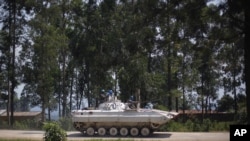Residents in the eastern part of the Democratic Republic of Congo (DRC) see better prospects for peace in the region now that preparations are underway for stationing a U.N. “intervention brigade” in the region, according to a U.N. official.
Madnodje Mounoubai, spokesman for the United Nations Stabilization Mission to the DRC (MONUSCO), said hopes in the region are rising after completion of a barracks complex where the U.N. troops will be housed.
“They hope that with this new intervention brigade, we will see the end of the armed groups, and with the end of the armed groups, peace will return and with peace, we can see stabilization, reconstruction and development in parts of this country,” Mounoubai said.
Residents in the eastern part of the African nation have often come under attack from various armed groups, including the M23 rebels.
“Those attacks are real for the IDPs [Internally Displaced Persons] and this is one of the reasons why they are always on the move,” said Mounoubai.
“The IDPs are in camps and they benefit from the protection of our people because we have patrols around those camps almost 24/7, because we patrol during the day and we patrol during the night,” said Mounoubai. “We also try to be on the alert, whenever we have information that certain towns are in danger of being attacked by [armed groups], we try to send patrols in the area to provide security to the population.”
Mounoubai warned that the new mandate for the intervention brigade enables peacekeepers to take the fight to the rebels to protect unarmed civilians as well as support the government in Kinshasa.
“We still want to give a chance to peace, but this time we are telling the armed groups that because they don’t want to abide by all the different accords they have signed, we are also going after them,” he said, “because they are the primary source of the insecurity of the population, and the creation of the thousands of IDPs that we are seeing.”
In March, U.N. Security Council authorized a special “intervention brigade” to pursue armed groups in the eastern part of the DRC as part of its peacekeeping operation.
The intervention brigade is made up of more than 3,000 troops from Tanzania, South Africa and Malawi. They operate as part of the U.N. mission, MONUSCO, but with a stronger mandate to attack the rebels.
Mounoubai predicted the arrival of the intervention force will reduce the attacks that often lead to hundreds of thousands of IDPs.
“I think this is the aim of the Security Council to provide lasting peace, not only in the eastern part of Congo, but in the whole of Congo,” said Mounoubai. “The mission of this intervention brigade in fact is to come and decisively deal with the armed groups once and for all. So the end result, we hope, will be the return of peace in this part of the country.”
Madnodje Mounoubai, spokesman for the United Nations Stabilization Mission to the DRC (MONUSCO), said hopes in the region are rising after completion of a barracks complex where the U.N. troops will be housed.
“They hope that with this new intervention brigade, we will see the end of the armed groups, and with the end of the armed groups, peace will return and with peace, we can see stabilization, reconstruction and development in parts of this country,” Mounoubai said.
Residents in the eastern part of the African nation have often come under attack from various armed groups, including the M23 rebels.
“Those attacks are real for the IDPs [Internally Displaced Persons] and this is one of the reasons why they are always on the move,” said Mounoubai.
“The IDPs are in camps and they benefit from the protection of our people because we have patrols around those camps almost 24/7, because we patrol during the day and we patrol during the night,” said Mounoubai. “We also try to be on the alert, whenever we have information that certain towns are in danger of being attacked by [armed groups], we try to send patrols in the area to provide security to the population.”
Mounoubai warned that the new mandate for the intervention brigade enables peacekeepers to take the fight to the rebels to protect unarmed civilians as well as support the government in Kinshasa.
“We still want to give a chance to peace, but this time we are telling the armed groups that because they don’t want to abide by all the different accords they have signed, we are also going after them,” he said, “because they are the primary source of the insecurity of the population, and the creation of the thousands of IDPs that we are seeing.”
In March, U.N. Security Council authorized a special “intervention brigade” to pursue armed groups in the eastern part of the DRC as part of its peacekeeping operation.
The intervention brigade is made up of more than 3,000 troops from Tanzania, South Africa and Malawi. They operate as part of the U.N. mission, MONUSCO, but with a stronger mandate to attack the rebels.
Mounoubai predicted the arrival of the intervention force will reduce the attacks that often lead to hundreds of thousands of IDPs.
“I think this is the aim of the Security Council to provide lasting peace, not only in the eastern part of Congo, but in the whole of Congo,” said Mounoubai. “The mission of this intervention brigade in fact is to come and decisively deal with the armed groups once and for all. So the end result, we hope, will be the return of peace in this part of the country.”





